BUS298: Analyzing Power and Culture in Organizational Change
VerifiedAdded on 2023/06/03
|13
|3117
|247
Essay
AI Summary
This essay examines the influence of power dynamics and national cultures, particularly in Singapore and Australia, on organizational change. It discusses different types of power, including legitimate, coercive, expert, informational, reward, and referent power, and their positive and negative aspects in change programs. The essay also applies Hofstede's cultural dimensions—Power Distance Index (PDI), Individualism vs. Collectivism (IDV), Masculinity vs. Femininity (MAS), Uncertainty Avoidance Index (UAI), Long-Term Orientation (LTO), and Indulgence vs. Restraint (IND)—to analyze how national culture affects the acceptance and implementation of power during organizational change. The analysis compares Australia and Singapore based on these dimensions, highlighting how cultural differences impact change management strategies. The essay concludes that understanding both power dynamics and cultural contexts is crucial for successful organizational development and change initiatives.
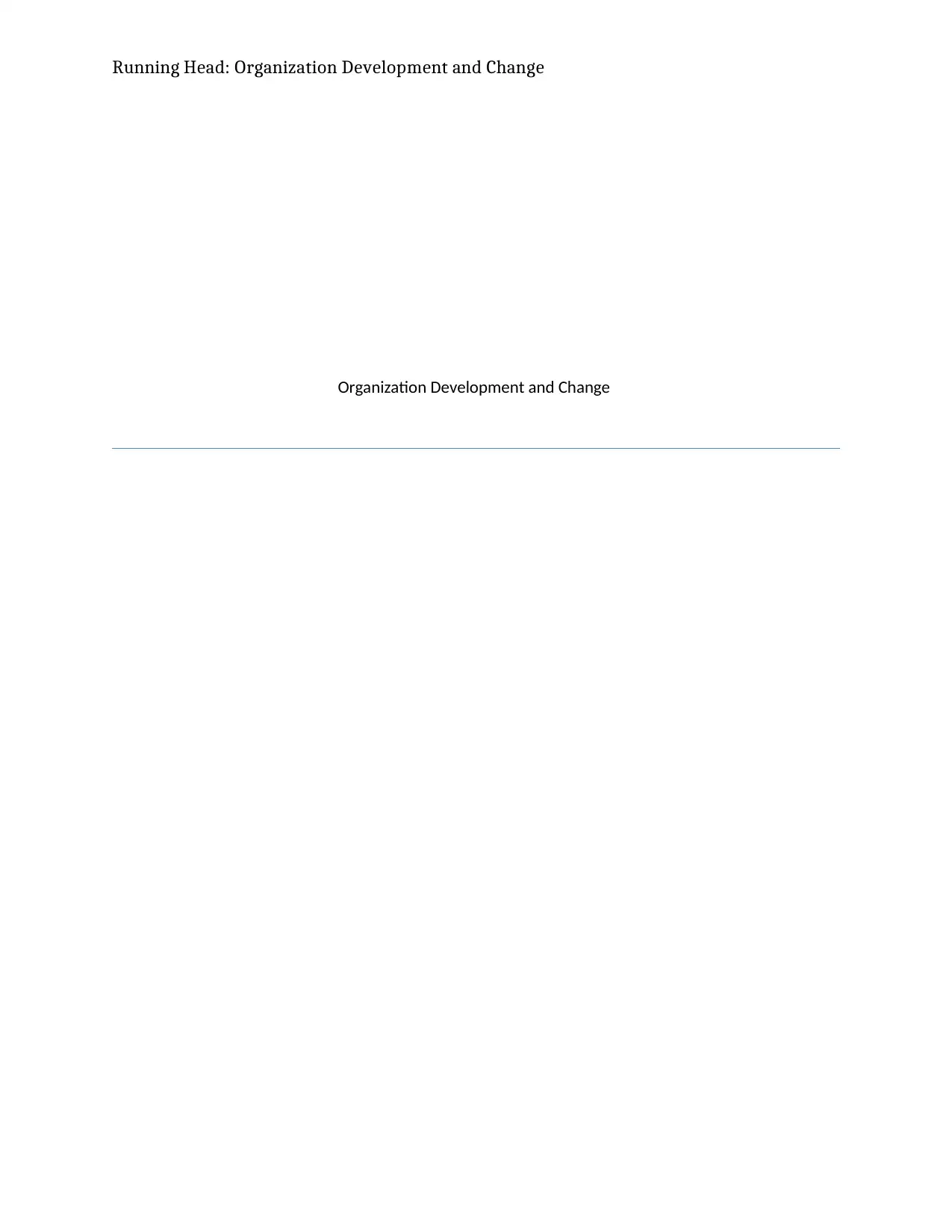
Running Head: Organization Development and Change
Organization Development and Change
Organization Development and Change
Paraphrase This Document
Need a fresh take? Get an instant paraphrase of this document with our AI Paraphraser
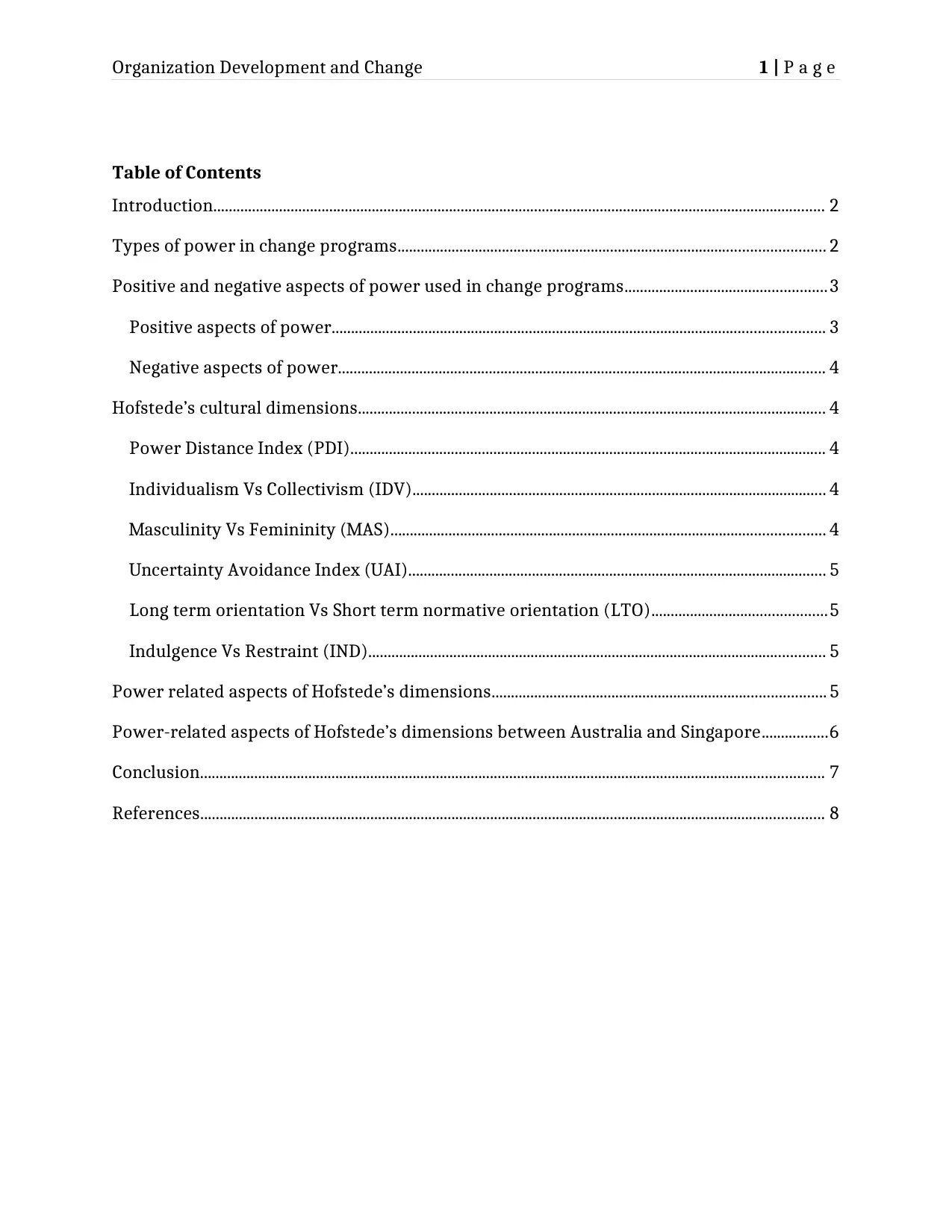
Organization Development and Change 1 | P a g e
Table of Contents
Introduction.............................................................................................................................................................. 2
Types of power in change programs.............................................................................................................. 2
Positive and negative aspects of power used in change programs....................................................3
Positive aspects of power............................................................................................................................... 3
Negative aspects of power.............................................................................................................................. 4
Hofstede’s cultural dimensions......................................................................................................................... 4
Power Distance Index (PDI)........................................................................................................................... 4
Individualism Vs Collectivism (IDV)........................................................................................................... 4
Masculinity Vs Femininity (MAS)................................................................................................................ 4
Uncertainty Avoidance Index (UAI)............................................................................................................ 5
Long term orientation Vs Short term normative orientation (LTO).............................................5
Indulgence Vs Restraint (IND)...................................................................................................................... 5
Power related aspects of Hofstede’s dimensions...................................................................................... 5
Power-related aspects of Hofstede’s dimensions between Australia and Singapore.................6
Conclusion................................................................................................................................................................. 7
References................................................................................................................................................................. 8
Table of Contents
Introduction.............................................................................................................................................................. 2
Types of power in change programs.............................................................................................................. 2
Positive and negative aspects of power used in change programs....................................................3
Positive aspects of power............................................................................................................................... 3
Negative aspects of power.............................................................................................................................. 4
Hofstede’s cultural dimensions......................................................................................................................... 4
Power Distance Index (PDI)........................................................................................................................... 4
Individualism Vs Collectivism (IDV)........................................................................................................... 4
Masculinity Vs Femininity (MAS)................................................................................................................ 4
Uncertainty Avoidance Index (UAI)............................................................................................................ 5
Long term orientation Vs Short term normative orientation (LTO).............................................5
Indulgence Vs Restraint (IND)...................................................................................................................... 5
Power related aspects of Hofstede’s dimensions...................................................................................... 5
Power-related aspects of Hofstede’s dimensions between Australia and Singapore.................6
Conclusion................................................................................................................................................................. 7
References................................................................................................................................................................. 8
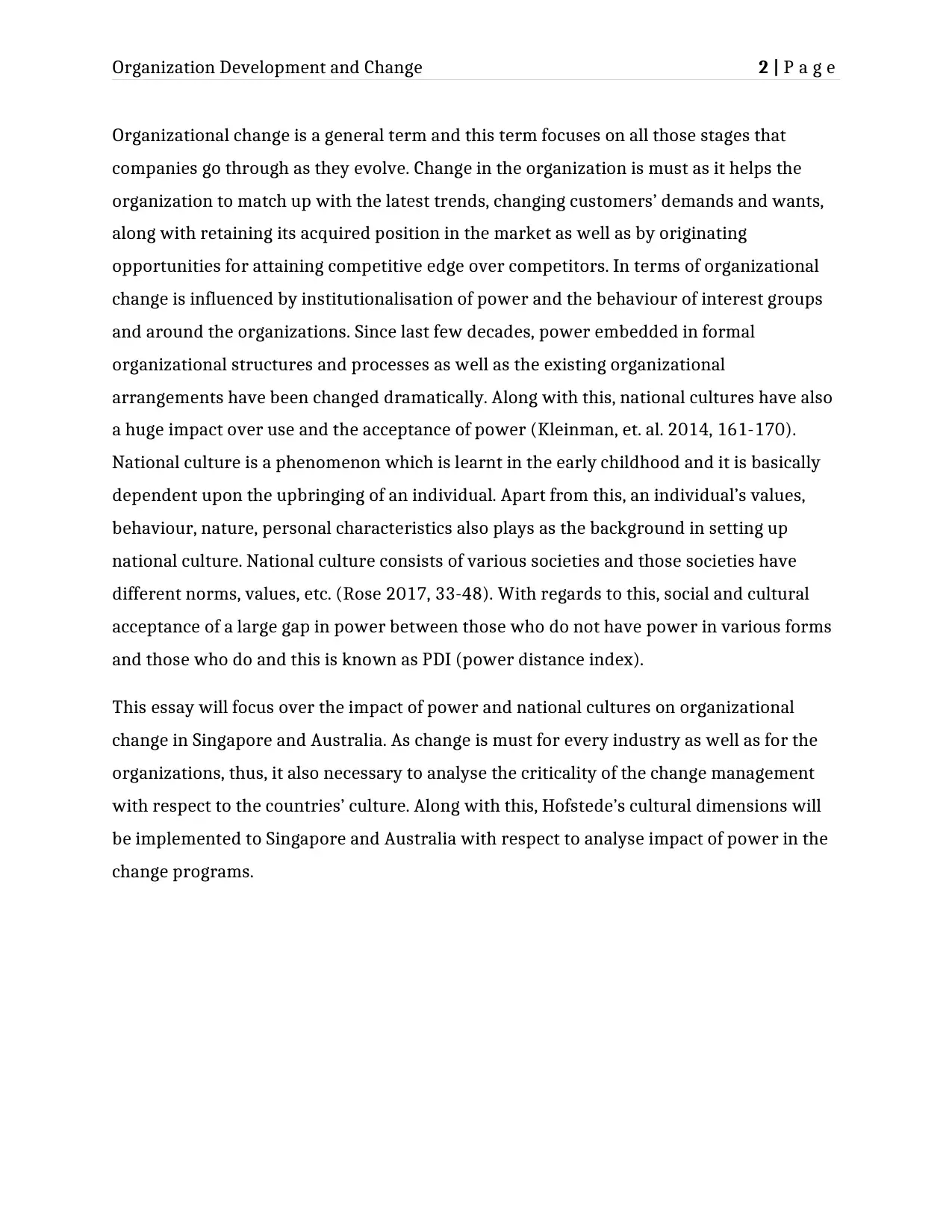
Organization Development and Change 2 | P a g e
Organizational change is a general term and this term focuses on all those stages that
companies go through as they evolve. Change in the organization is must as it helps the
organization to match up with the latest trends, changing customers’ demands and wants,
along with retaining its acquired position in the market as well as by originating
opportunities for attaining competitive edge over competitors. In terms of organizational
change is influenced by institutionalisation of power and the behaviour of interest groups
and around the organizations. Since last few decades, power embedded in formal
organizational structures and processes as well as the existing organizational
arrangements have been changed dramatically. Along with this, national cultures have also
a huge impact over use and the acceptance of power (Kleinman, et. al. 2014, 161-170).
National culture is a phenomenon which is learnt in the early childhood and it is basically
dependent upon the upbringing of an individual. Apart from this, an individual’s values,
behaviour, nature, personal characteristics also plays as the background in setting up
national culture. National culture consists of various societies and those societies have
different norms, values, etc. (Rose 2017, 33-48). With regards to this, social and cultural
acceptance of a large gap in power between those who do not have power in various forms
and those who do and this is known as PDI (power distance index).
This essay will focus over the impact of power and national cultures on organizational
change in Singapore and Australia. As change is must for every industry as well as for the
organizations, thus, it also necessary to analyse the criticality of the change management
with respect to the countries’ culture. Along with this, Hofstede’s cultural dimensions will
be implemented to Singapore and Australia with respect to analyse impact of power in the
change programs.
Organizational change is a general term and this term focuses on all those stages that
companies go through as they evolve. Change in the organization is must as it helps the
organization to match up with the latest trends, changing customers’ demands and wants,
along with retaining its acquired position in the market as well as by originating
opportunities for attaining competitive edge over competitors. In terms of organizational
change is influenced by institutionalisation of power and the behaviour of interest groups
and around the organizations. Since last few decades, power embedded in formal
organizational structures and processes as well as the existing organizational
arrangements have been changed dramatically. Along with this, national cultures have also
a huge impact over use and the acceptance of power (Kleinman, et. al. 2014, 161-170).
National culture is a phenomenon which is learnt in the early childhood and it is basically
dependent upon the upbringing of an individual. Apart from this, an individual’s values,
behaviour, nature, personal characteristics also plays as the background in setting up
national culture. National culture consists of various societies and those societies have
different norms, values, etc. (Rose 2017, 33-48). With regards to this, social and cultural
acceptance of a large gap in power between those who do not have power in various forms
and those who do and this is known as PDI (power distance index).
This essay will focus over the impact of power and national cultures on organizational
change in Singapore and Australia. As change is must for every industry as well as for the
organizations, thus, it also necessary to analyse the criticality of the change management
with respect to the countries’ culture. Along with this, Hofstede’s cultural dimensions will
be implemented to Singapore and Australia with respect to analyse impact of power in the
change programs.
⊘ This is a preview!⊘
Do you want full access?
Subscribe today to unlock all pages.

Trusted by 1+ million students worldwide
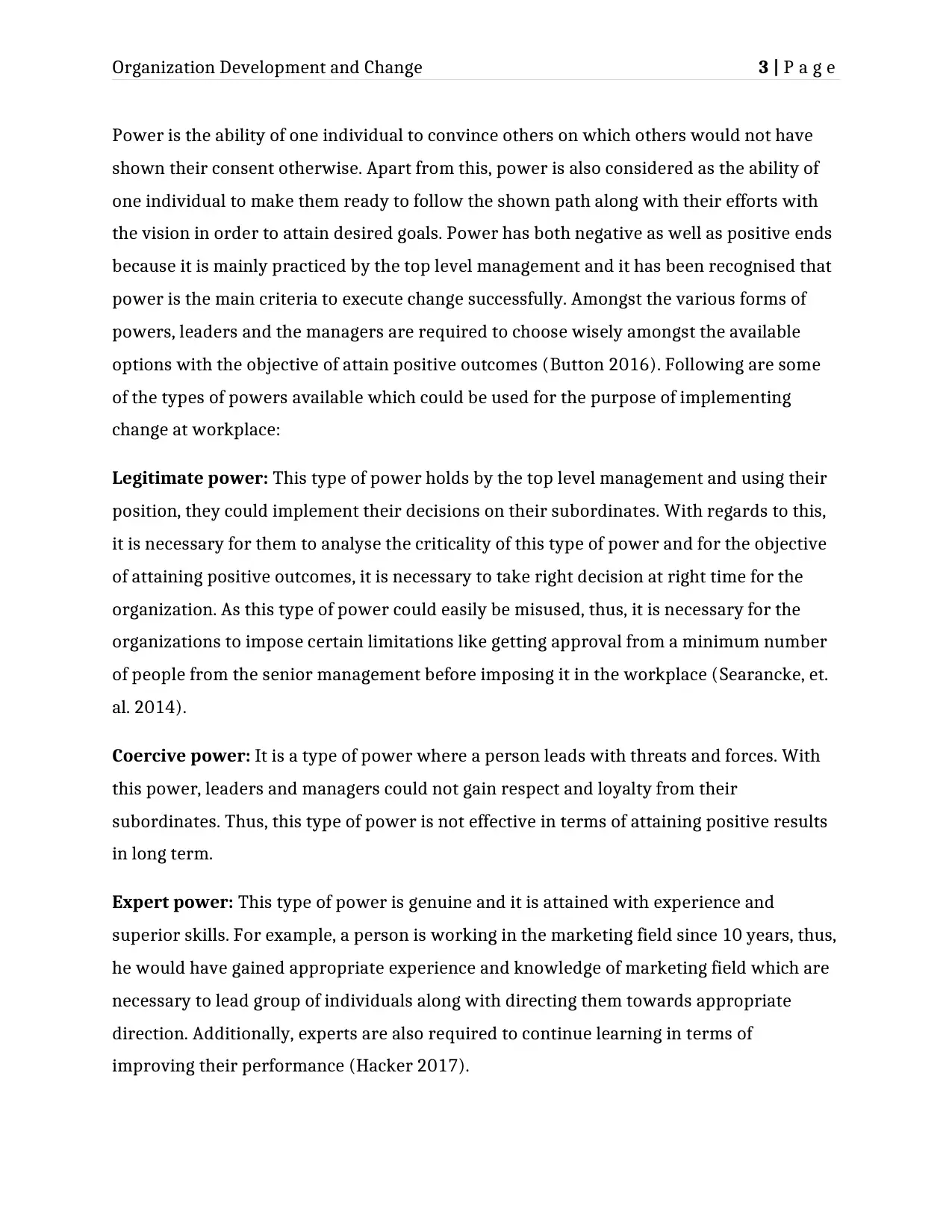
Organization Development and Change 3 | P a g e
Power is the ability of one individual to convince others on which others would not have
shown their consent otherwise. Apart from this, power is also considered as the ability of
one individual to make them ready to follow the shown path along with their efforts with
the vision in order to attain desired goals. Power has both negative as well as positive ends
because it is mainly practiced by the top level management and it has been recognised that
power is the main criteria to execute change successfully. Amongst the various forms of
powers, leaders and the managers are required to choose wisely amongst the available
options with the objective of attain positive outcomes (Button 2016). Following are some
of the types of powers available which could be used for the purpose of implementing
change at workplace:
Legitimate power: This type of power holds by the top level management and using their
position, they could implement their decisions on their subordinates. With regards to this,
it is necessary for them to analyse the criticality of this type of power and for the objective
of attaining positive outcomes, it is necessary to take right decision at right time for the
organization. As this type of power could easily be misused, thus, it is necessary for the
organizations to impose certain limitations like getting approval from a minimum number
of people from the senior management before imposing it in the workplace (Searancke, et.
al. 2014).
Coercive power: It is a type of power where a person leads with threats and forces. With
this power, leaders and managers could not gain respect and loyalty from their
subordinates. Thus, this type of power is not effective in terms of attaining positive results
in long term.
Expert power: This type of power is genuine and it is attained with experience and
superior skills. For example, a person is working in the marketing field since 10 years, thus,
he would have gained appropriate experience and knowledge of marketing field which are
necessary to lead group of individuals along with directing them towards appropriate
direction. Additionally, experts are also required to continue learning in terms of
improving their performance (Hacker 2017).
Power is the ability of one individual to convince others on which others would not have
shown their consent otherwise. Apart from this, power is also considered as the ability of
one individual to make them ready to follow the shown path along with their efforts with
the vision in order to attain desired goals. Power has both negative as well as positive ends
because it is mainly practiced by the top level management and it has been recognised that
power is the main criteria to execute change successfully. Amongst the various forms of
powers, leaders and the managers are required to choose wisely amongst the available
options with the objective of attain positive outcomes (Button 2016). Following are some
of the types of powers available which could be used for the purpose of implementing
change at workplace:
Legitimate power: This type of power holds by the top level management and using their
position, they could implement their decisions on their subordinates. With regards to this,
it is necessary for them to analyse the criticality of this type of power and for the objective
of attaining positive outcomes, it is necessary to take right decision at right time for the
organization. As this type of power could easily be misused, thus, it is necessary for the
organizations to impose certain limitations like getting approval from a minimum number
of people from the senior management before imposing it in the workplace (Searancke, et.
al. 2014).
Coercive power: It is a type of power where a person leads with threats and forces. With
this power, leaders and managers could not gain respect and loyalty from their
subordinates. Thus, this type of power is not effective in terms of attaining positive results
in long term.
Expert power: This type of power is genuine and it is attained with experience and
superior skills. For example, a person is working in the marketing field since 10 years, thus,
he would have gained appropriate experience and knowledge of marketing field which are
necessary to lead group of individuals along with directing them towards appropriate
direction. Additionally, experts are also required to continue learning in terms of
improving their performance (Hacker 2017).
Paraphrase This Document
Need a fresh take? Get an instant paraphrase of this document with our AI Paraphraser
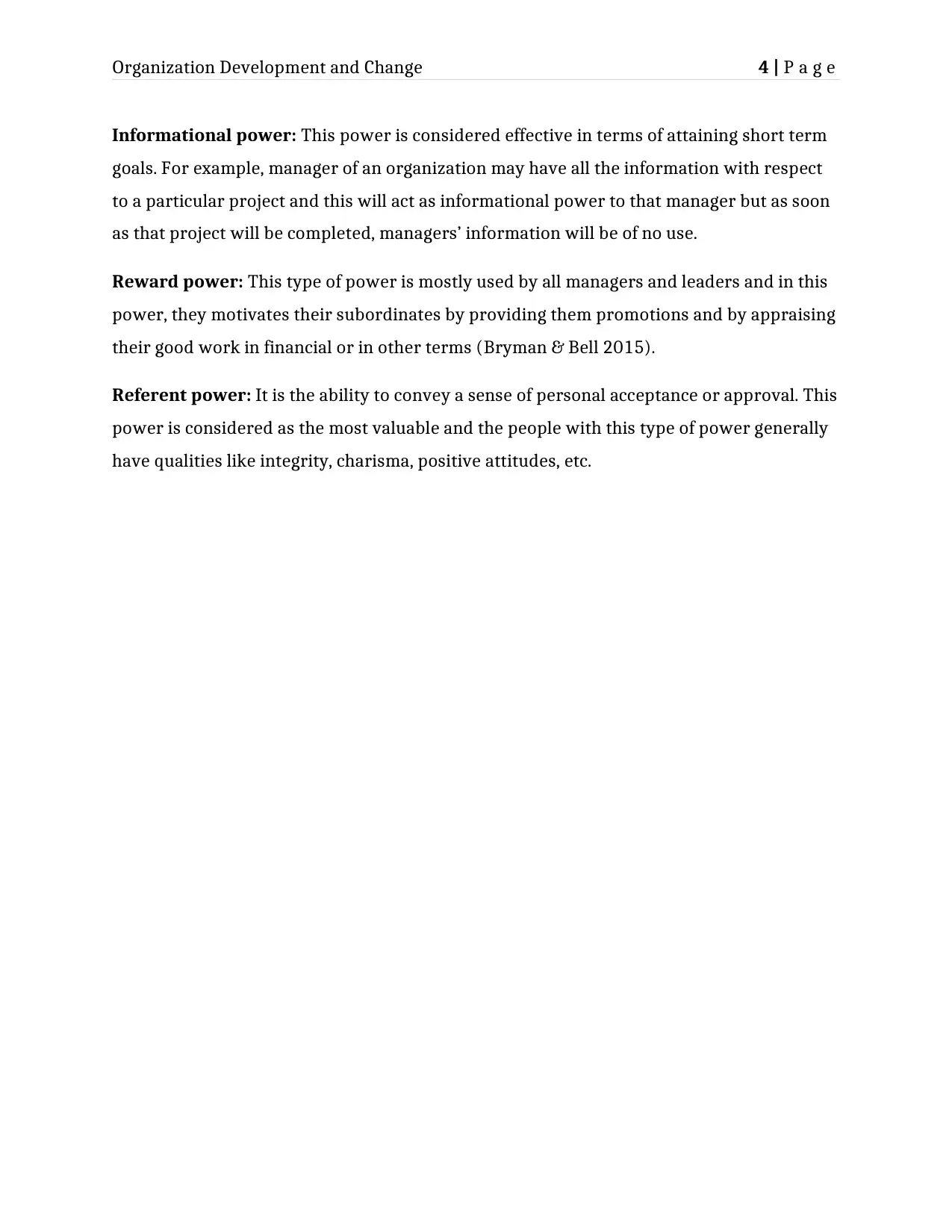
Organization Development and Change 4 | P a g e
Informational power: This power is considered effective in terms of attaining short term
goals. For example, manager of an organization may have all the information with respect
to a particular project and this will act as informational power to that manager but as soon
as that project will be completed, managers’ information will be of no use.
Reward power: This type of power is mostly used by all managers and leaders and in this
power, they motivates their subordinates by providing them promotions and by appraising
their good work in financial or in other terms (Bryman & Bell 2015).
Referent power: It is the ability to convey a sense of personal acceptance or approval. This
power is considered as the most valuable and the people with this type of power generally
have qualities like integrity, charisma, positive attitudes, etc.
Informational power: This power is considered effective in terms of attaining short term
goals. For example, manager of an organization may have all the information with respect
to a particular project and this will act as informational power to that manager but as soon
as that project will be completed, managers’ information will be of no use.
Reward power: This type of power is mostly used by all managers and leaders and in this
power, they motivates their subordinates by providing them promotions and by appraising
their good work in financial or in other terms (Bryman & Bell 2015).
Referent power: It is the ability to convey a sense of personal acceptance or approval. This
power is considered as the most valuable and the people with this type of power generally
have qualities like integrity, charisma, positive attitudes, etc.
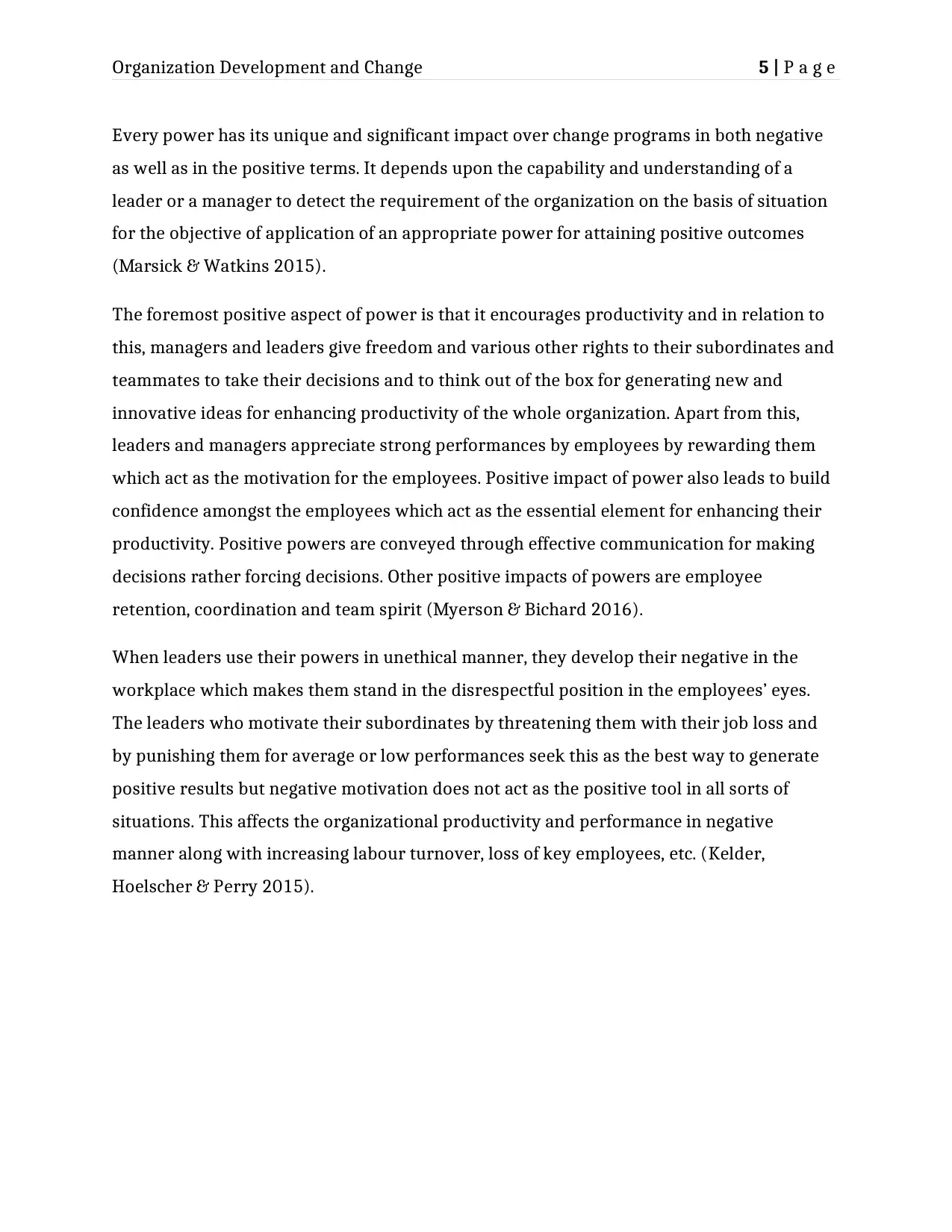
Organization Development and Change 5 | P a g e
Every power has its unique and significant impact over change programs in both negative
as well as in the positive terms. It depends upon the capability and understanding of a
leader or a manager to detect the requirement of the organization on the basis of situation
for the objective of application of an appropriate power for attaining positive outcomes
(Marsick & Watkins 2015).
The foremost positive aspect of power is that it encourages productivity and in relation to
this, managers and leaders give freedom and various other rights to their subordinates and
teammates to take their decisions and to think out of the box for generating new and
innovative ideas for enhancing productivity of the whole organization. Apart from this,
leaders and managers appreciate strong performances by employees by rewarding them
which act as the motivation for the employees. Positive impact of power also leads to build
confidence amongst the employees which act as the essential element for enhancing their
productivity. Positive powers are conveyed through effective communication for making
decisions rather forcing decisions. Other positive impacts of powers are employee
retention, coordination and team spirit (Myerson & Bichard 2016).
When leaders use their powers in unethical manner, they develop their negative in the
workplace which makes them stand in the disrespectful position in the employees’ eyes.
The leaders who motivate their subordinates by threatening them with their job loss and
by punishing them for average or low performances seek this as the best way to generate
positive results but negative motivation does not act as the positive tool in all sorts of
situations. This affects the organizational productivity and performance in negative
manner along with increasing labour turnover, loss of key employees, etc. (Kelder,
Hoelscher & Perry 2015).
Every power has its unique and significant impact over change programs in both negative
as well as in the positive terms. It depends upon the capability and understanding of a
leader or a manager to detect the requirement of the organization on the basis of situation
for the objective of application of an appropriate power for attaining positive outcomes
(Marsick & Watkins 2015).
The foremost positive aspect of power is that it encourages productivity and in relation to
this, managers and leaders give freedom and various other rights to their subordinates and
teammates to take their decisions and to think out of the box for generating new and
innovative ideas for enhancing productivity of the whole organization. Apart from this,
leaders and managers appreciate strong performances by employees by rewarding them
which act as the motivation for the employees. Positive impact of power also leads to build
confidence amongst the employees which act as the essential element for enhancing their
productivity. Positive powers are conveyed through effective communication for making
decisions rather forcing decisions. Other positive impacts of powers are employee
retention, coordination and team spirit (Myerson & Bichard 2016).
When leaders use their powers in unethical manner, they develop their negative in the
workplace which makes them stand in the disrespectful position in the employees’ eyes.
The leaders who motivate their subordinates by threatening them with their job loss and
by punishing them for average or low performances seek this as the best way to generate
positive results but negative motivation does not act as the positive tool in all sorts of
situations. This affects the organizational productivity and performance in negative
manner along with increasing labour turnover, loss of key employees, etc. (Kelder,
Hoelscher & Perry 2015).
⊘ This is a preview!⊘
Do you want full access?
Subscribe today to unlock all pages.

Trusted by 1+ million students worldwide
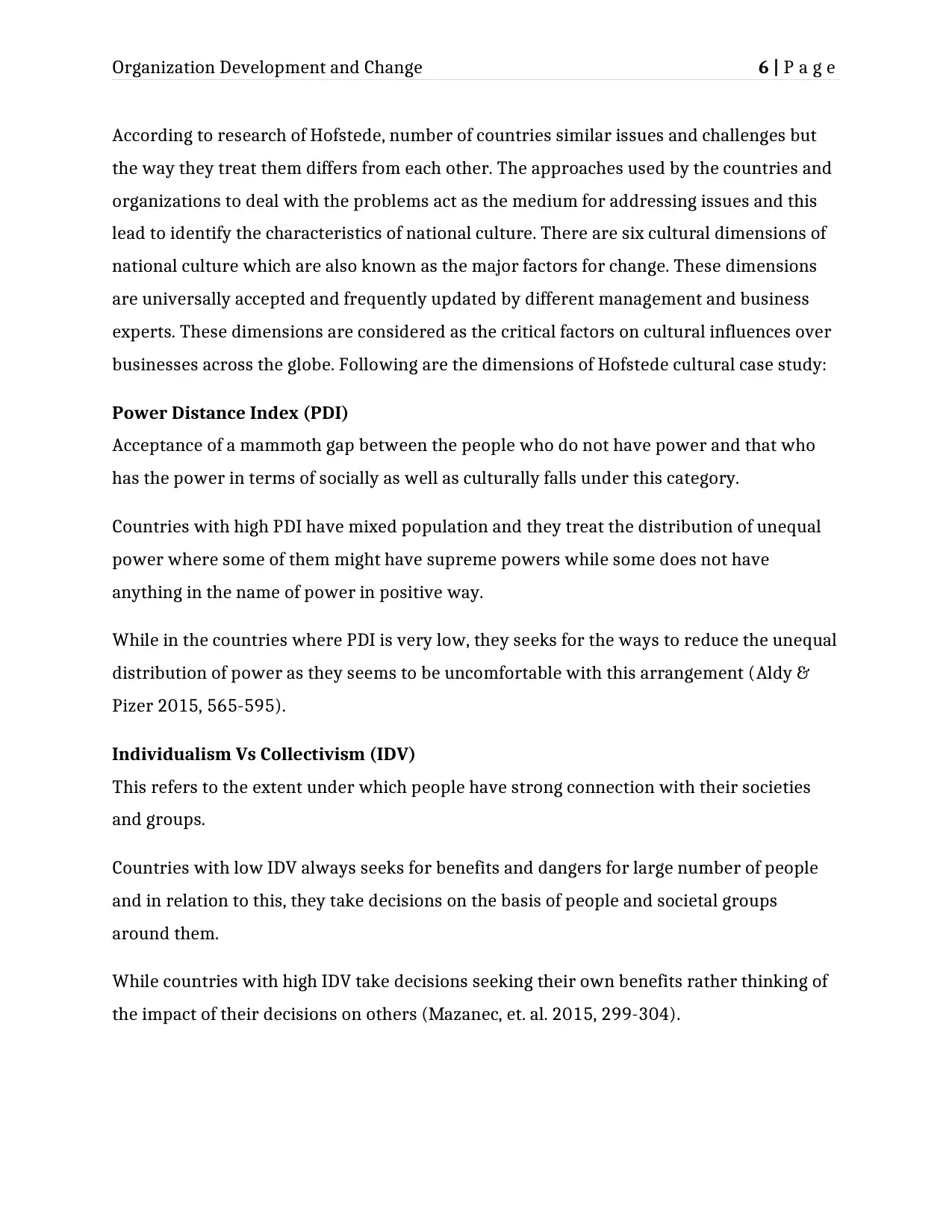
Organization Development and Change 6 | P a g e
According to research of Hofstede, number of countries similar issues and challenges but
the way they treat them differs from each other. The approaches used by the countries and
organizations to deal with the problems act as the medium for addressing issues and this
lead to identify the characteristics of national culture. There are six cultural dimensions of
national culture which are also known as the major factors for change. These dimensions
are universally accepted and frequently updated by different management and business
experts. These dimensions are considered as the critical factors on cultural influences over
businesses across the globe. Following are the dimensions of Hofstede cultural case study:
Power Distance Index (PDI)
Acceptance of a mammoth gap between the people who do not have power and that who
has the power in terms of socially as well as culturally falls under this category.
Countries with high PDI have mixed population and they treat the distribution of unequal
power where some of them might have supreme powers while some does not have
anything in the name of power in positive way.
While in the countries where PDI is very low, they seeks for the ways to reduce the unequal
distribution of power as they seems to be uncomfortable with this arrangement (Aldy &
Pizer 2015, 565-595).
Individualism Vs Collectivism (IDV)
This refers to the extent under which people have strong connection with their societies
and groups.
Countries with low IDV always seeks for benefits and dangers for large number of people
and in relation to this, they take decisions on the basis of people and societal groups
around them.
While countries with high IDV take decisions seeking their own benefits rather thinking of
the impact of their decisions on others (Mazanec, et. al. 2015, 299-304).
According to research of Hofstede, number of countries similar issues and challenges but
the way they treat them differs from each other. The approaches used by the countries and
organizations to deal with the problems act as the medium for addressing issues and this
lead to identify the characteristics of national culture. There are six cultural dimensions of
national culture which are also known as the major factors for change. These dimensions
are universally accepted and frequently updated by different management and business
experts. These dimensions are considered as the critical factors on cultural influences over
businesses across the globe. Following are the dimensions of Hofstede cultural case study:
Power Distance Index (PDI)
Acceptance of a mammoth gap between the people who do not have power and that who
has the power in terms of socially as well as culturally falls under this category.
Countries with high PDI have mixed population and they treat the distribution of unequal
power where some of them might have supreme powers while some does not have
anything in the name of power in positive way.
While in the countries where PDI is very low, they seeks for the ways to reduce the unequal
distribution of power as they seems to be uncomfortable with this arrangement (Aldy &
Pizer 2015, 565-595).
Individualism Vs Collectivism (IDV)
This refers to the extent under which people have strong connection with their societies
and groups.
Countries with low IDV always seeks for benefits and dangers for large number of people
and in relation to this, they take decisions on the basis of people and societal groups
around them.
While countries with high IDV take decisions seeking their own benefits rather thinking of
the impact of their decisions on others (Mazanec, et. al. 2015, 299-304).
Paraphrase This Document
Need a fresh take? Get an instant paraphrase of this document with our AI Paraphraser
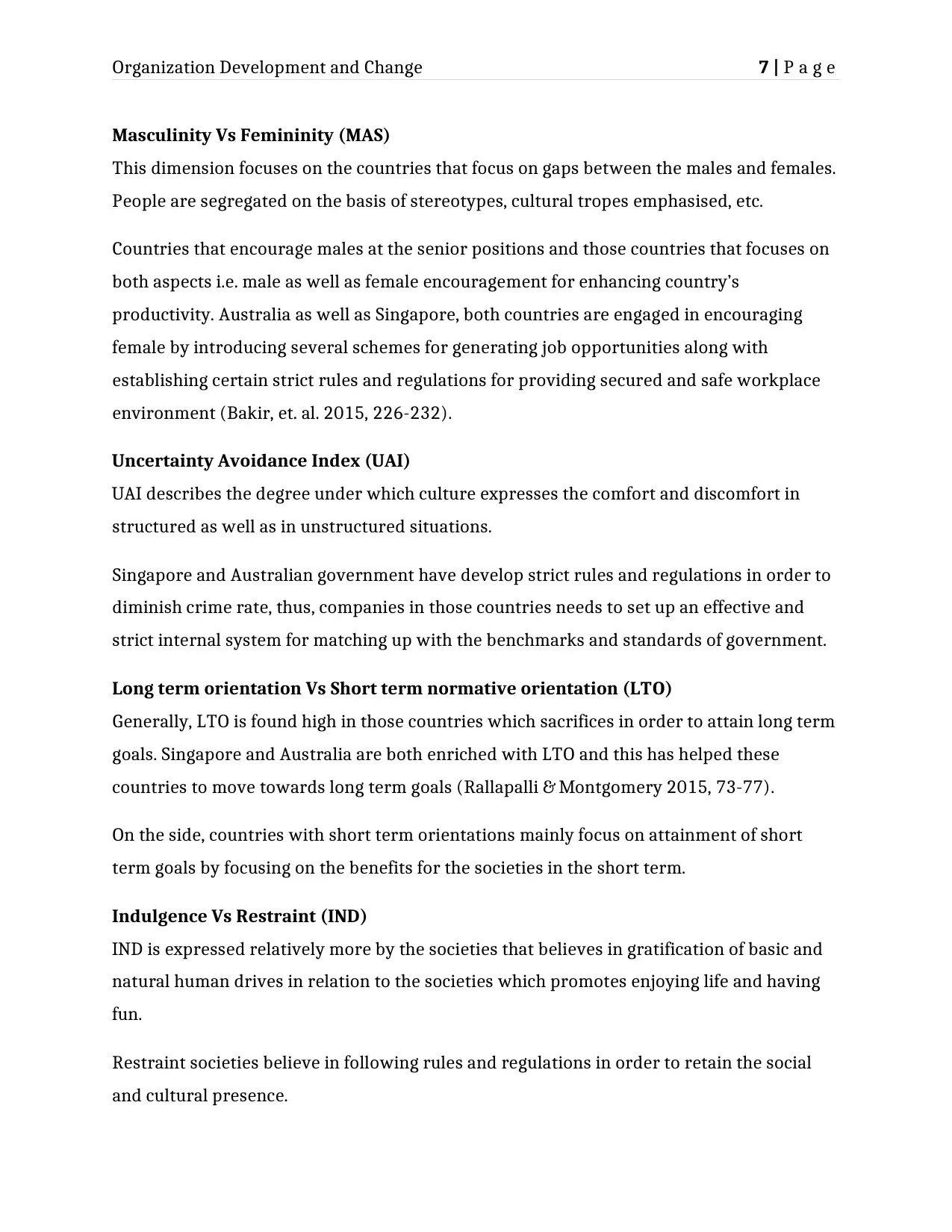
Organization Development and Change 7 | P a g e
Masculinity Vs Femininity (MAS)
This dimension focuses on the countries that focus on gaps between the males and females.
People are segregated on the basis of stereotypes, cultural tropes emphasised, etc.
Countries that encourage males at the senior positions and those countries that focuses on
both aspects i.e. male as well as female encouragement for enhancing country’s
productivity. Australia as well as Singapore, both countries are engaged in encouraging
female by introducing several schemes for generating job opportunities along with
establishing certain strict rules and regulations for providing secured and safe workplace
environment (Bakir, et. al. 2015, 226-232).
Uncertainty Avoidance Index (UAI)
UAI describes the degree under which culture expresses the comfort and discomfort in
structured as well as in unstructured situations.
Singapore and Australian government have develop strict rules and regulations in order to
diminish crime rate, thus, companies in those countries needs to set up an effective and
strict internal system for matching up with the benchmarks and standards of government.
Long term orientation Vs Short term normative orientation (LTO)
Generally, LTO is found high in those countries which sacrifices in order to attain long term
goals. Singapore and Australia are both enriched with LTO and this has helped these
countries to move towards long term goals (Rallapalli & Montgomery 2015, 73-77).
On the side, countries with short term orientations mainly focus on attainment of short
term goals by focusing on the benefits for the societies in the short term.
Indulgence Vs Restraint (IND)
IND is expressed relatively more by the societies that believes in gratification of basic and
natural human drives in relation to the societies which promotes enjoying life and having
fun.
Restraint societies believe in following rules and regulations in order to retain the social
and cultural presence.
Masculinity Vs Femininity (MAS)
This dimension focuses on the countries that focus on gaps between the males and females.
People are segregated on the basis of stereotypes, cultural tropes emphasised, etc.
Countries that encourage males at the senior positions and those countries that focuses on
both aspects i.e. male as well as female encouragement for enhancing country’s
productivity. Australia as well as Singapore, both countries are engaged in encouraging
female by introducing several schemes for generating job opportunities along with
establishing certain strict rules and regulations for providing secured and safe workplace
environment (Bakir, et. al. 2015, 226-232).
Uncertainty Avoidance Index (UAI)
UAI describes the degree under which culture expresses the comfort and discomfort in
structured as well as in unstructured situations.
Singapore and Australian government have develop strict rules and regulations in order to
diminish crime rate, thus, companies in those countries needs to set up an effective and
strict internal system for matching up with the benchmarks and standards of government.
Long term orientation Vs Short term normative orientation (LTO)
Generally, LTO is found high in those countries which sacrifices in order to attain long term
goals. Singapore and Australia are both enriched with LTO and this has helped these
countries to move towards long term goals (Rallapalli & Montgomery 2015, 73-77).
On the side, countries with short term orientations mainly focus on attainment of short
term goals by focusing on the benefits for the societies in the short term.
Indulgence Vs Restraint (IND)
IND is expressed relatively more by the societies that believes in gratification of basic and
natural human drives in relation to the societies which promotes enjoying life and having
fun.
Restraint societies believe in following rules and regulations in order to retain the social
and cultural presence.
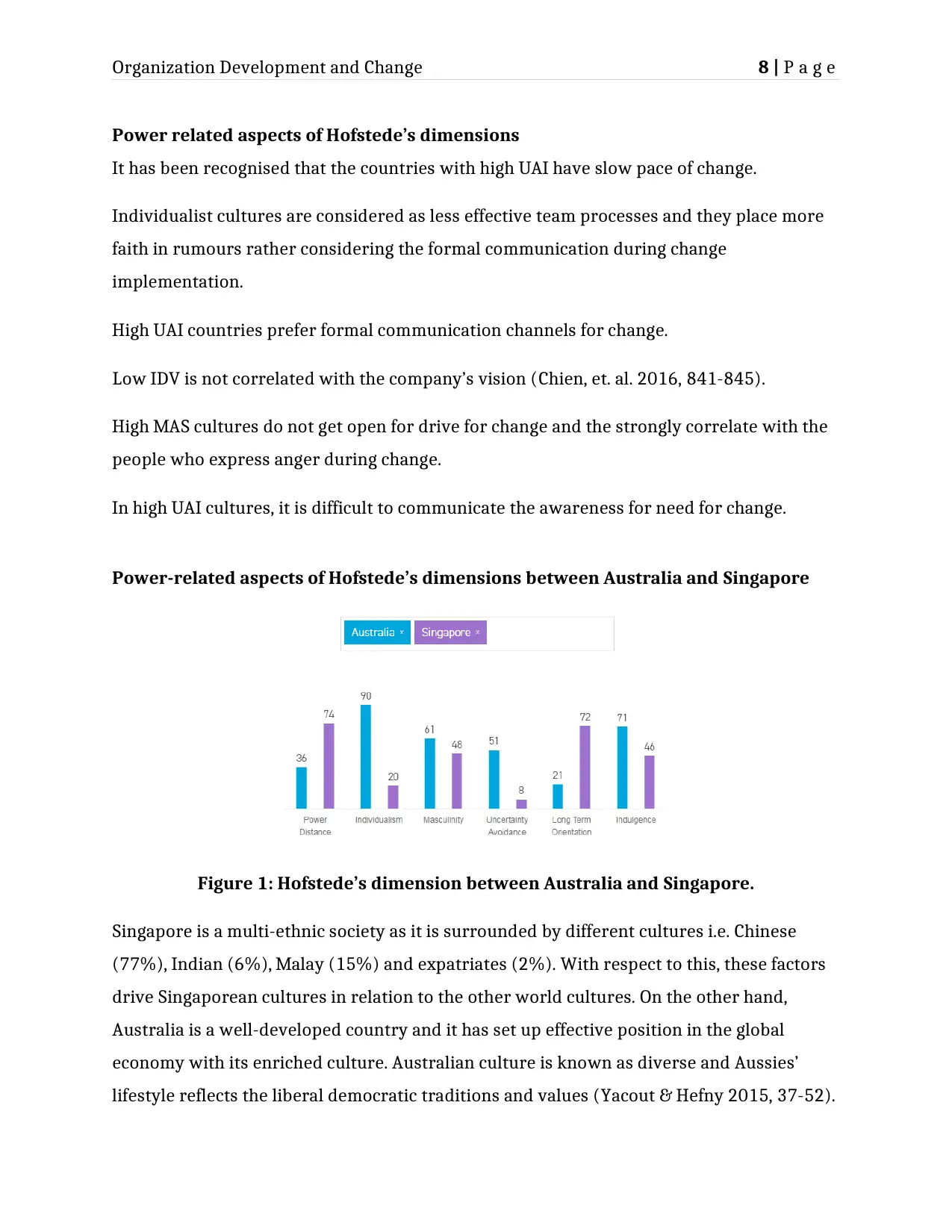
Organization Development and Change 8 | P a g e
Power related aspects of Hofstede’s dimensions
It has been recognised that the countries with high UAI have slow pace of change.
Individualist cultures are considered as less effective team processes and they place more
faith in rumours rather considering the formal communication during change
implementation.
High UAI countries prefer formal communication channels for change.
Low IDV is not correlated with the company’s vision (Chien, et. al. 2016, 841-845).
High MAS cultures do not get open for drive for change and the strongly correlate with the
people who express anger during change.
In high UAI cultures, it is difficult to communicate the awareness for need for change.
Power-related aspects of Hofstede’s dimensions between Australia and Singapore
Figure 1: Hofstede’s dimension between Australia and Singapore.
Singapore is a multi-ethnic society as it is surrounded by different cultures i.e. Chinese
(77%), Indian (6%), Malay (15%) and expatriates (2%). With respect to this, these factors
drive Singaporean cultures in relation to the other world cultures. On the other hand,
Australia is a well-developed country and it has set up effective position in the global
economy with its enriched culture. Australian culture is known as diverse and Aussies’
lifestyle reflects the liberal democratic traditions and values (Yacout & Hefny 2015, 37-52).
Power related aspects of Hofstede’s dimensions
It has been recognised that the countries with high UAI have slow pace of change.
Individualist cultures are considered as less effective team processes and they place more
faith in rumours rather considering the formal communication during change
implementation.
High UAI countries prefer formal communication channels for change.
Low IDV is not correlated with the company’s vision (Chien, et. al. 2016, 841-845).
High MAS cultures do not get open for drive for change and the strongly correlate with the
people who express anger during change.
In high UAI cultures, it is difficult to communicate the awareness for need for change.
Power-related aspects of Hofstede’s dimensions between Australia and Singapore
Figure 1: Hofstede’s dimension between Australia and Singapore.
Singapore is a multi-ethnic society as it is surrounded by different cultures i.e. Chinese
(77%), Indian (6%), Malay (15%) and expatriates (2%). With respect to this, these factors
drive Singaporean cultures in relation to the other world cultures. On the other hand,
Australia is a well-developed country and it has set up effective position in the global
economy with its enriched culture. Australian culture is known as diverse and Aussies’
lifestyle reflects the liberal democratic traditions and values (Yacout & Hefny 2015, 37-52).
⊘ This is a preview!⊘
Do you want full access?
Subscribe today to unlock all pages.

Trusted by 1+ million students worldwide
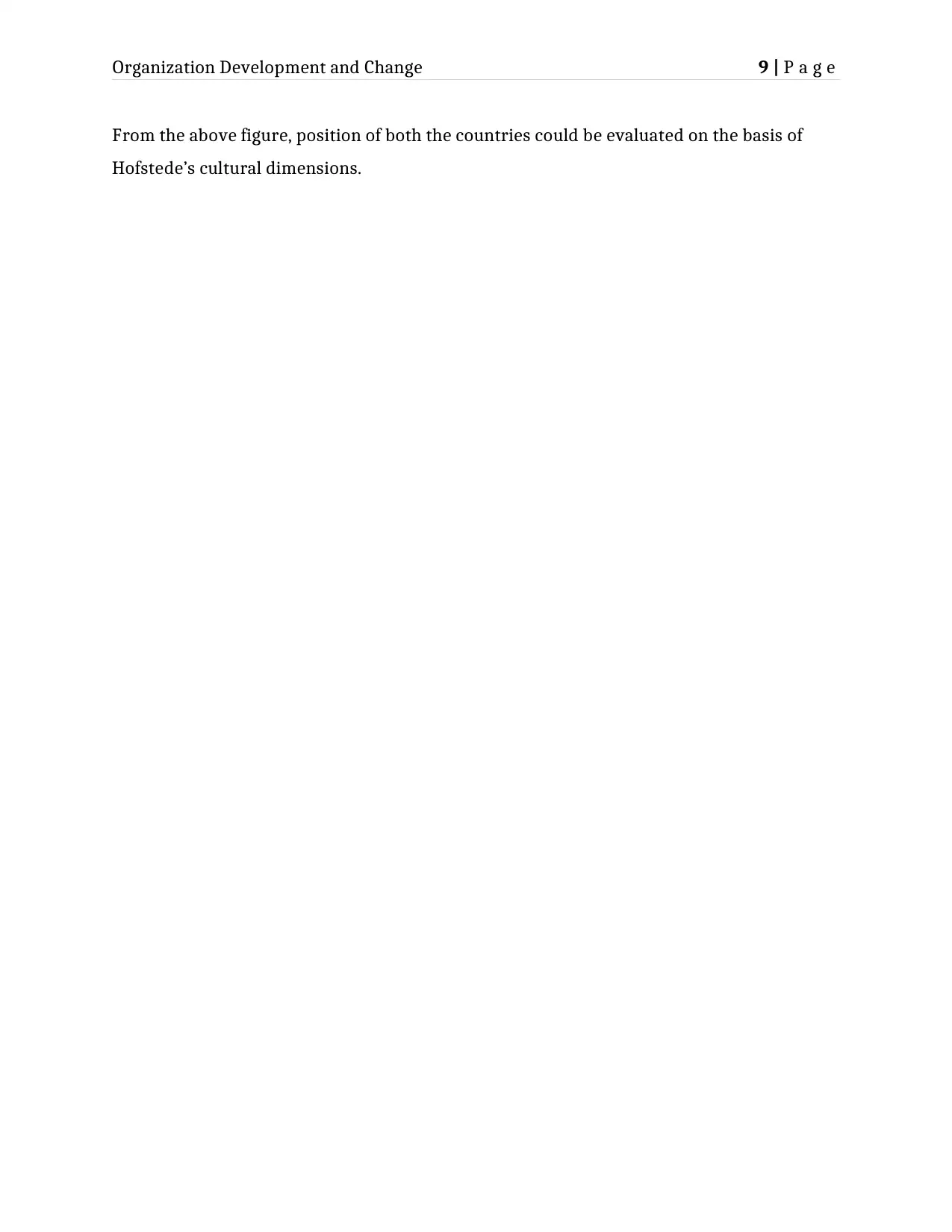
Organization Development and Change 9 | P a g e
From the above figure, position of both the countries could be evaluated on the basis of
Hofstede’s cultural dimensions.
From the above figure, position of both the countries could be evaluated on the basis of
Hofstede’s cultural dimensions.
Paraphrase This Document
Need a fresh take? Get an instant paraphrase of this document with our AI Paraphraser
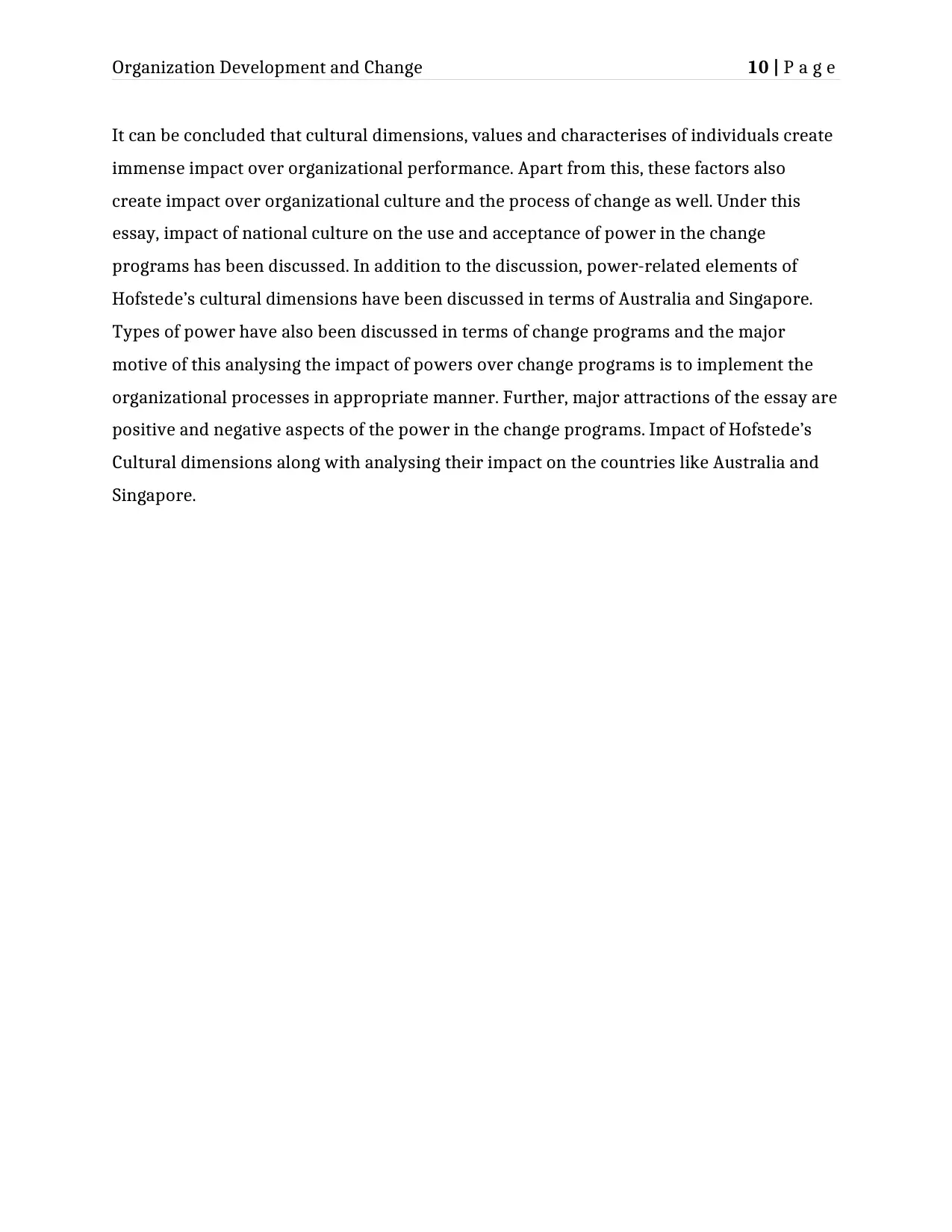
Organization Development and Change 10 | P a g e
It can be concluded that cultural dimensions, values and characterises of individuals create
immense impact over organizational performance. Apart from this, these factors also
create impact over organizational culture and the process of change as well. Under this
essay, impact of national culture on the use and acceptance of power in the change
programs has been discussed. In addition to the discussion, power-related elements of
Hofstede’s cultural dimensions have been discussed in terms of Australia and Singapore.
Types of power have also been discussed in terms of change programs and the major
motive of this analysing the impact of powers over change programs is to implement the
organizational processes in appropriate manner. Further, major attractions of the essay are
positive and negative aspects of the power in the change programs. Impact of Hofstede’s
Cultural dimensions along with analysing their impact on the countries like Australia and
Singapore.
It can be concluded that cultural dimensions, values and characterises of individuals create
immense impact over organizational performance. Apart from this, these factors also
create impact over organizational culture and the process of change as well. Under this
essay, impact of national culture on the use and acceptance of power in the change
programs has been discussed. In addition to the discussion, power-related elements of
Hofstede’s cultural dimensions have been discussed in terms of Australia and Singapore.
Types of power have also been discussed in terms of change programs and the major
motive of this analysing the impact of powers over change programs is to implement the
organizational processes in appropriate manner. Further, major attractions of the essay are
positive and negative aspects of the power in the change programs. Impact of Hofstede’s
Cultural dimensions along with analysing their impact on the countries like Australia and
Singapore.
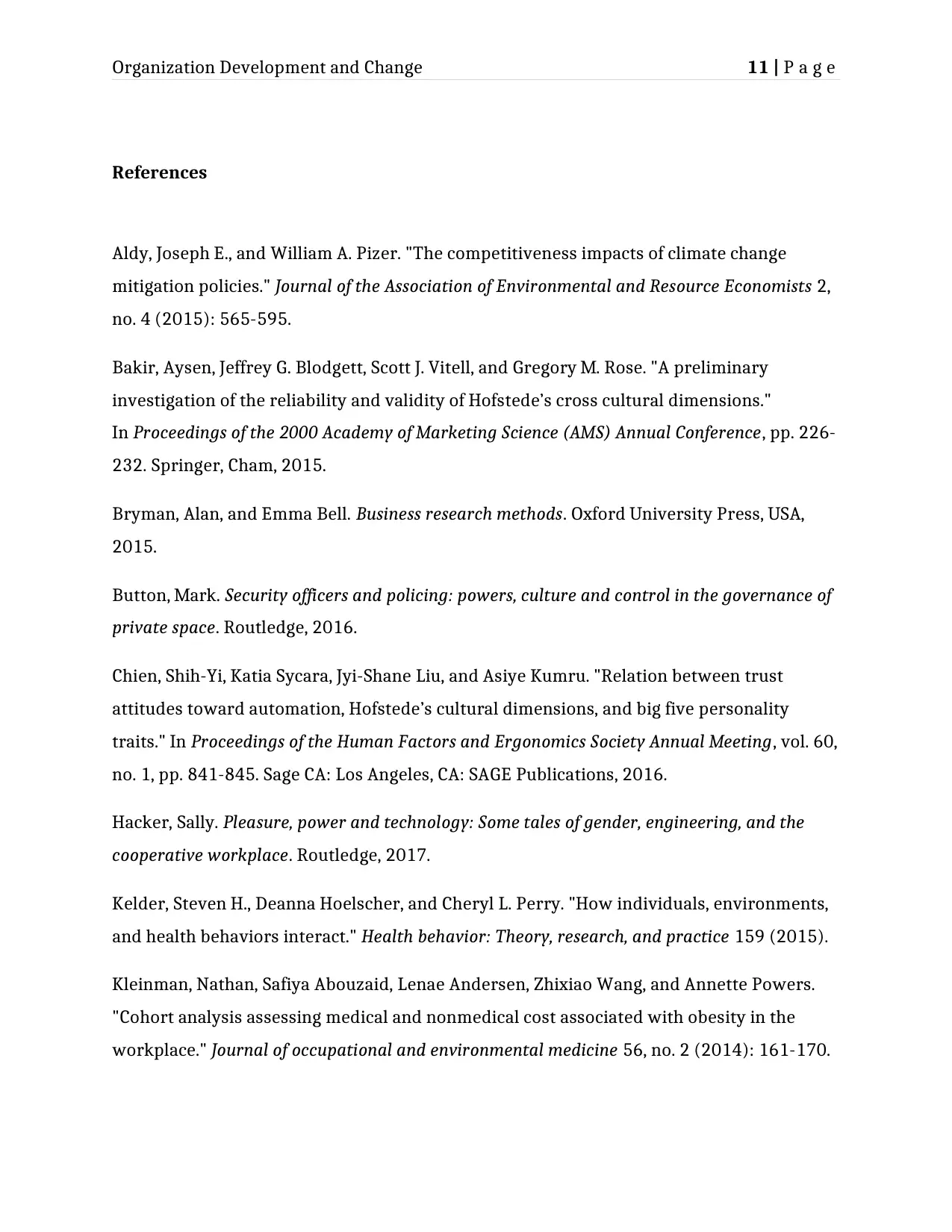
Organization Development and Change 11 | P a g e
References
Aldy, Joseph E., and William A. Pizer. "The competitiveness impacts of climate change
mitigation policies." Journal of the Association of Environmental and Resource Economists 2,
no. 4 (2015): 565-595.
Bakir, Aysen, Jeffrey G. Blodgett, Scott J. Vitell, and Gregory M. Rose. "A preliminary
investigation of the reliability and validity of Hofstede’s cross cultural dimensions."
In Proceedings of the 2000 Academy of Marketing Science (AMS) Annual Conference, pp. 226-
232. Springer, Cham, 2015.
Bryman, Alan, and Emma Bell. Business research methods. Oxford University Press, USA,
2015.
Button, Mark. Security officers and policing: powers, culture and control in the governance of
private space. Routledge, 2016.
Chien, Shih-Yi, Katia Sycara, Jyi-Shane Liu, and Asiye Kumru. "Relation between trust
attitudes toward automation, Hofstede’s cultural dimensions, and big five personality
traits." In Proceedings of the Human Factors and Ergonomics Society Annual Meeting, vol. 60,
no. 1, pp. 841-845. Sage CA: Los Angeles, CA: SAGE Publications, 2016.
Hacker, Sally. Pleasure, power and technology: Some tales of gender, engineering, and the
cooperative workplace. Routledge, 2017.
Kelder, Steven H., Deanna Hoelscher, and Cheryl L. Perry. "How individuals, environments,
and health behaviors interact." Health behavior: Theory, research, and practice 159 (2015).
Kleinman, Nathan, Safiya Abouzaid, Lenae Andersen, Zhixiao Wang, and Annette Powers.
"Cohort analysis assessing medical and nonmedical cost associated with obesity in the
workplace." Journal of occupational and environmental medicine 56, no. 2 (2014): 161-170.
References
Aldy, Joseph E., and William A. Pizer. "The competitiveness impacts of climate change
mitigation policies." Journal of the Association of Environmental and Resource Economists 2,
no. 4 (2015): 565-595.
Bakir, Aysen, Jeffrey G. Blodgett, Scott J. Vitell, and Gregory M. Rose. "A preliminary
investigation of the reliability and validity of Hofstede’s cross cultural dimensions."
In Proceedings of the 2000 Academy of Marketing Science (AMS) Annual Conference, pp. 226-
232. Springer, Cham, 2015.
Bryman, Alan, and Emma Bell. Business research methods. Oxford University Press, USA,
2015.
Button, Mark. Security officers and policing: powers, culture and control in the governance of
private space. Routledge, 2016.
Chien, Shih-Yi, Katia Sycara, Jyi-Shane Liu, and Asiye Kumru. "Relation between trust
attitudes toward automation, Hofstede’s cultural dimensions, and big five personality
traits." In Proceedings of the Human Factors and Ergonomics Society Annual Meeting, vol. 60,
no. 1, pp. 841-845. Sage CA: Los Angeles, CA: SAGE Publications, 2016.
Hacker, Sally. Pleasure, power and technology: Some tales of gender, engineering, and the
cooperative workplace. Routledge, 2017.
Kelder, Steven H., Deanna Hoelscher, and Cheryl L. Perry. "How individuals, environments,
and health behaviors interact." Health behavior: Theory, research, and practice 159 (2015).
Kleinman, Nathan, Safiya Abouzaid, Lenae Andersen, Zhixiao Wang, and Annette Powers.
"Cohort analysis assessing medical and nonmedical cost associated with obesity in the
workplace." Journal of occupational and environmental medicine 56, no. 2 (2014): 161-170.
⊘ This is a preview!⊘
Do you want full access?
Subscribe today to unlock all pages.

Trusted by 1+ million students worldwide
1 out of 13
Related Documents
Your All-in-One AI-Powered Toolkit for Academic Success.
+13062052269
info@desklib.com
Available 24*7 on WhatsApp / Email
![[object Object]](/_next/static/media/star-bottom.7253800d.svg)
Unlock your academic potential
Copyright © 2020–2026 A2Z Services. All Rights Reserved. Developed and managed by ZUCOL.





